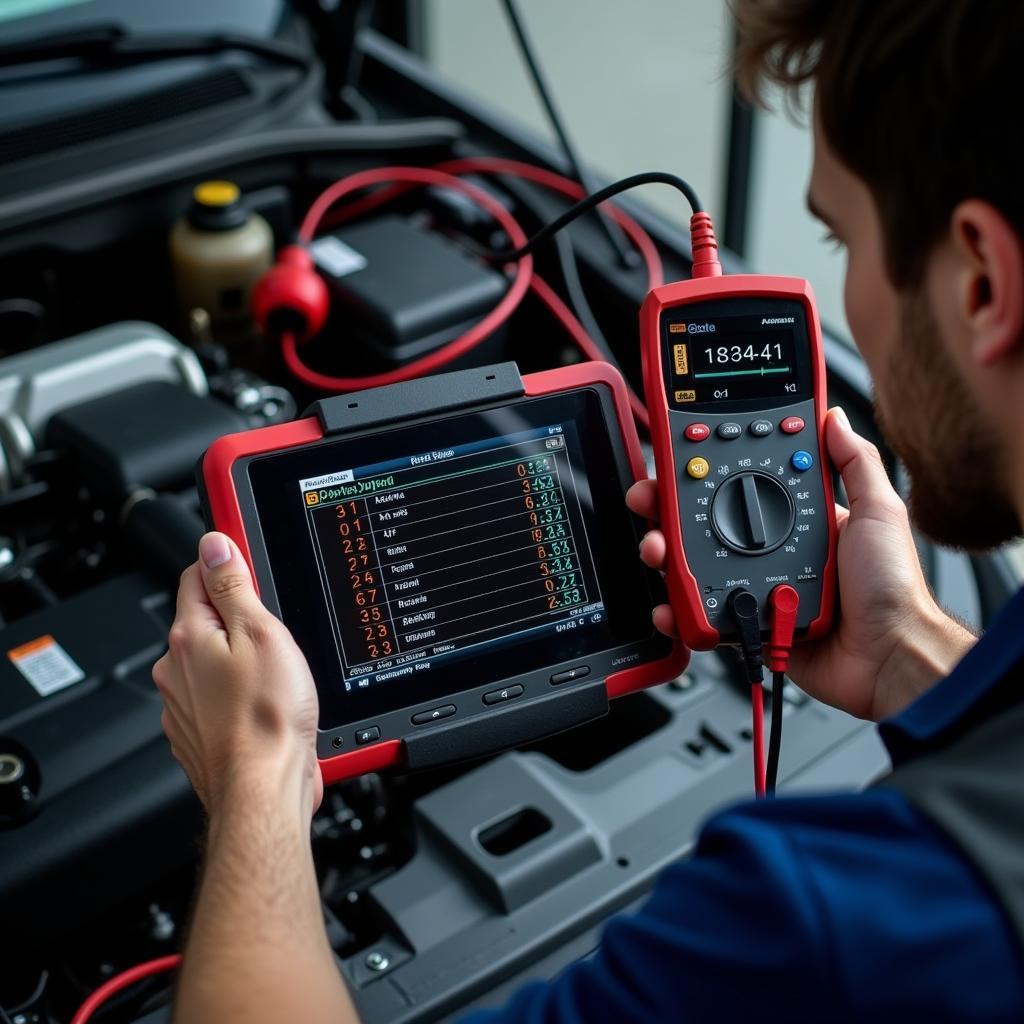Investing in the right Tools To Buy As A Car Mechanic is crucial for efficiency, accuracy, and a successful career. Whether you’re just starting out or a seasoned pro, having a well-equipped toolbox can make all the difference in diagnosing and repairing vehicles effectively. This guide explores the must-have tools for every car mechanic, covering everything from basic hand tools to advanced diagnostic equipment.
Must-Have Hand Tools for Every Mechanic
Every car mechanic needs a solid foundation of hand tools. These are the workhorses of your trade, allowing you to tackle a wide range of tasks. Essential hand tools include:
- Wrenches: A comprehensive set of wrenches, including combination wrenches, open-end wrenches, and ratcheting wrenches, is a must-have. Different sizes are needed for various bolt and nut sizes.
- Screwdrivers: A variety of screwdrivers, including Phillips, flathead, and Torx, are essential for removing screws and fasteners.
- Pliers: Different types of pliers, such as slip-joint pliers, needle-nose pliers, and locking pliers, provide grip and leverage for various tasks.
- Sockets and Ratchets: Socket sets with various drive sizes (1/4″, 3/8″, 1/2″) and a range of sockets are crucial for removing and tightening nuts and bolts in tight spaces.
- Hammers: A ball-peen hammer and a rubber mallet are essential for striking and shaping metal parts.
Investing in high-quality hand tools buy car garage tools ensures durability and reliable performance.
Advanced Diagnostic Tools: Embracing Technology
In today’s automotive world, vehicles are becoming increasingly complex, requiring sophisticated diagnostic tools. These tools help mechanics quickly identify problems, saving time and improving accuracy. Key diagnostic tools include:
- OBD-II Scanners: These scanners connect to the vehicle’s onboard diagnostic system, retrieving diagnostic trouble codes (DTCs) and providing valuable insights into the vehicle’s performance.
- Multimeters: Multimeters measure voltage, current, and resistance, allowing mechanics to test electrical circuits and components.
- Oscilloscope: An oscilloscope displays electrical signals, helping diagnose complex electrical issues and sensor problems.
- Pressure Gauges: These gauges measure pressure in various vehicle systems, such as the fuel system, cooling system, and brake system.
 Advanced Diagnostic Tools for Car Mechanics
Advanced Diagnostic Tools for Car Mechanics
Choosing the right diagnostic tools is crucial. Consider factors like features, compatibility, and budget when making your decisions. how to buy diagnostic tools in car mechanic simulator 2018 can provide valuable insights into selection criteria.
Specialty Tools for Specific Tasks
Beyond the basic hand tools and diagnostic equipment, certain specialized tools are designed for specific tasks, enhancing efficiency and precision. Some examples include:
- Brake Bleeders: These tools are used to remove air from brake lines, ensuring proper brake function.
- Fuel Injection Testers: These testers diagnose problems with fuel injectors, a crucial component of the fuel system.
- Battery Testers and Chargers: These tools assess battery health and charge depleted batteries.
- Compression Testers: These testers measure cylinder compression, helping identify engine problems.
“Investing in specialized tools demonstrates a commitment to quality workmanship and ensures you’re prepared for any automotive challenge,” says automotive expert, Robert Johnson. Having the right tools for the job shows professionalism and can enhance your credibility as a mechanic.
Don’t forget the importance of car battery crimping tool for secure battery connections.
Conclusion: Equipping Yourself for Success as a Car Mechanic
Investing in the right tools to buy as a car mechanic is an investment in your career. From essential hand tools to advanced diagnostic equipment and specialized tools, having the correct tools at your disposal empowers you to work efficiently, accurately, and confidently. By selecting high-quality tools and staying up-to-date with technological advancements, you can excel in the ever-evolving automotive industry. do car mechanics have to buy their own tools offers additional information on tooling requirements for mechanics.
FAQs
- What are the most essential hand tools for a beginner mechanic?
- How often should I calibrate my diagnostic tools?
- Where can I find reliable sources for purchasing automotive tools?
- What are the benefits of investing in high-quality tools?
- What are some important safety precautions to consider when using automotive tools?
- What are some resources for learning about new automotive tools and technologies?
- How do I maintain my tools to ensure their longevity?
Do you have other questions? Check out our article on used cars tool tx.
Need support? Contact us via WhatsApp: +1(641)206-8880, Email: [email protected] or visit us at 910 Cedar Lane, Chicago, IL 60605, USA. Our customer service team is available 24/7.

Leave a Reply